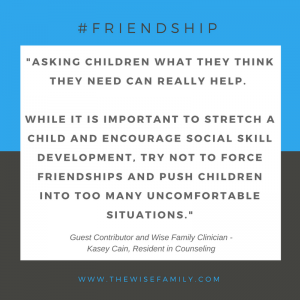An Invitation to Friendship
March 22, 2017
By Guest Contributor and Wise Family Clinician – Kasey Cain, Resident in Counseling

I have a very vivid memory of pulling into the parking lot at my daughter’s pre-school while the classes were outside on the playground. I scanned the area, watching kids run and laugh and then my eyes landed on my daughter. She was sitting alone, off to the side, quietly running her hands through the grass. Instantly I got that uncomfortable pit in my stomach and my mind filled with worry. Why wasn’t anyone playing with my daughter? Did she not have friends at school? Was she lonely? Most parents I have worked with can share a similar experience. They all want their child to be included. For some children, the ability to develop friendships comes naturally but for others, a bit more support is needed.
Here are just a few helpful tips to support your child in making friends.
Take cues from your child:
You may want your child to make lots of friends, but is that what your child wants or needs? When I asked my daughter why she was alone, her response was, “I was playing tag and decided I was done. I wanted some quiet to rest.”
Asking children what they think they need can really help. While it is important to stretch a child and encourage social skill development, try not to force friendships and push children into too many uncomfortable situations. If your child needs shorter playdates or quiet time afterward to calm down, help them find that time.
Provide opportunities in a safe space:
Support your child’s friendship skill development in familiar environments, such as your home or a park or playground you frequently visit. (Keep in mind that sharing personal toys and belongings can sometimes add another challenging).
Prepare for what is coming:
Talk about the playdate ahead of time, and practice specific social skills. There are so many different ways to do this- some overt and other more subtle.
Playing board games helps children develop the ability to take turns. It also provides chances to practice pro-social reactions to winning and losing.
Role playing with each other or using puppets is a fun way to practice conversations. Instead of asking “Can I join in?” or “Can I play with you?” which allows kids to answer with a yes or no, have your child ask “How can I help?” or “What can I do in this game?”.
Use thought bubbles and speech bubbles on paper to help kids think about what is happening and how they feel and to script what they will say (see above suggestions).
Come up with a Plan A and Plan B in case things don’t go as expected.
Practice reading facial expressions and non-verbal cues:
This is perhaps one of the more challenging skills to teach, especially to our kids on the Autism spectrum or with ADHD. Practice this by talking about characters in books or on TV shows. What are characters thinking or feeling? Why?
Less is more:
Like adults, kids really need simply one or two close friends instead of being best friends with a slew of peers. Also, don’t jump into everything at once. Try one suggestion at a time. The goal is for your child to get better at social interactions, not become the world’s most popular individual.
(Content written in collaboration with Lipsett Learning Connection)
About Kasey:
Kasey is a mom to two fabulous daughters, loves mint chocolate chip ice cream, and loves to dance. She has very acute hearing and can track multiple conversations at once! She loves to read and take naps in her spare time. Kasey’s knowledge of the school system and best practices for teaching and learning, paired with her honed counseling skills, leaves her expertly suited to work with children and their families. She believes in the power of play and that all behavior is communication.
She holds a Masters in Education for School Counseling and a Post Counseling Licensure Certificate in Community Counseling. She is actively pursuing licensure in Virginia as a Licensed Professional Counselor. Her professional journey has included teaching, working at the United States Holocaust Memorial Museum education programming department, and community counseling. Since 2006, she has worked in Fairfax County Public schools as an Elementary Professional School Counselor and as a Resource Counselor for School Counseling Services in FCPS’s central office.
**
Until next week, Be Wise!













